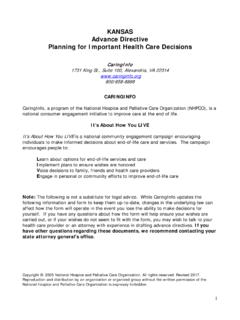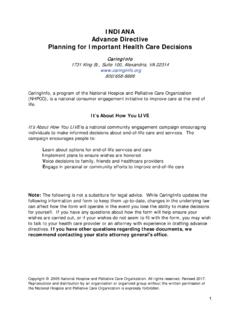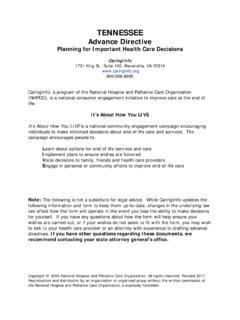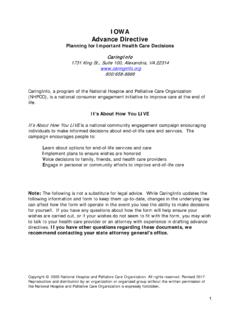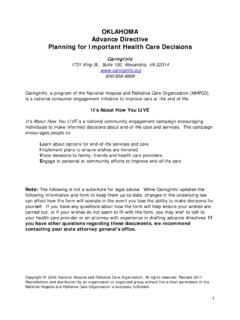Transcription of CALIFORNIA - CaringInfo
1 1 CALIFORNIA Advance Directive Planning for Important Health Care Decisions Caring Info 1731 King St., Suite 100, Alexandria, VA 22314 800/658-8898 Caring Info, a program of the National Hospice and Palliative Care Organization (NHPCO), is a national consumer engagement initiative to improve care at the end of life. It s About How You LIVE It s About How You LIVE is a national community engagement campaign encouraging individuals to make informed decisions about end-of-life care and services. The campaign encourages people to: Learn about options for end-of-life services and care Implement plans to ensure wishes are honored Voice decisions to family, friends and health care providers Engage in personal or community efforts to improve end-of-life care Note: The following is not a substitute for legal advice. While Caring Info updates the following information and form to keep them up-to-date, changes in the underlying law can affect how the form will operate in the event you lose the ability to make decisions for yourself.
2 If you have any questions about how the form will help ensure your wishes are carried out, or if your wishes do not seem to fit with the form, you may wish to talk to your health care provider or an attorney with experience in drafting advance directives. If you have other questions regarding these documents, we recommend contacting your state attorney general's office. Copyright 2005 National Hospice and Palliative Care Organization. All rights reserved. Revised 2017. Reproduction and distribution by an organization or organized group without the written permission of the National Hospice and Palliative Care Organization is expressly forbidden. 2 Using these Materials BEFORE YOU BEGIN 1. Check to be sure that you have the materials for each state in which you may receive health care. 2. These materials include: Instructions for preparing your advance directive, please read all the instructions.
3 Your state-specific advance directive forms, which are the pages with the gray instruction bar on the left side. ACTION STEPS 1. You may want to photocopy or print a second set of these forms before you start so you will have a clean copy if you need to start over. 2. When you begin to fill out the forms, refer to the gray instruction bars they will guide you through the process. 3. Talk with your family, friends, and physicians about your advance directive. Be sure the person you appoint to make decisions on your behalf understands your wishes. 4. Once the form is completed and signed, photocopy the form and give it to the person you have appointed to make decisions on your behalf, your family, friends, health care providers and/or faith leaders so that the form is available in the event of an emergency. 5. CALIFORNIA maintains an Advance Directive Registry.
4 By filing your advance directive with the registry, your health care provider and loved ones may be able to find a copy of your directive in the event you are unable to provide one. You can read more about the registry, including instructions on how to file your advance directive, at 6. You may also want to save a copy of your form in an online personal health records application, program, or service that allows you to share your medical documents with your physicians, family, and others who you want to take an active role in your advance care planning. 3 INTRODUCTION TO YOUR CALIFORNIA ADVANCE HEALTH CARE DIRECTIVE This packet contains a legal document, a CALIFORNIA Advance Health Care Directive, that protects your right to refuse medical treatment you do not want, or to request treatment you do want, in the event you lose the ability to make decisions yourself.
5 You may complete any or all of the first four parts, depending on your advance planning needs. You must complete part 5. Part 1 is a Power of Attorney for Health Care. This part lets you name someone (an agent) to make decisions about your health care. Unless otherwise written in your advance directive, your power of attorney for health care becomes effective when your primary doctor determines that you lack the ability to understand the nature and consequences of your health care decisions or the ability to make and communicate your health care decisions. If you want your agent to make health care decisions for you now, even though you are still capable of making health care decisions, you can include this instruction in your power of attorney for health care designation. Part 2 includes your Individual Instructions. This is your state s living will. It lets you state your wishes about health care in the event that you can no longer speak for yourself and you may limit the individual instructions to take effect only if a specified condition arises.
6 Part 3 allows you to express your wishes regarding organ donation. Part 4 of this form lets you designate a physician to have primary responsibility for your health care. Part 5 contains the signature and witnessing provisions so that your document will be effective. This form does not expressly address mental illness. If you would like to make advance care plans regarding mental illness, you should talk to your physician and an attorney about an advance directive tailored to your needs. Note: These documents will be legally binding only if the person completing them is a competent adult, who is 18 years of age or older, or an emancipated minor. 4 INSTRUCTIONS FOR YOUR CALIFORNIA ADVANCE HEALTH CARE DIRECTIVE How do I make my advance health care directive legal? You must sign and date your advance directive or direct an adult to do so for you if you are unable to sign it yourself.
7 You r signature must be witnessed by or you must acknowledge your signature before a notary public or two adult witnesses. Your two adult witnesses may not be your health care provider or an employee of your health care provider, the operator or an employee of a community care facility, the operator or an employee of a residential care facility for the elderly, or the person you have appointed as an agent, if you have appointed an agent. In addition, one of your witnesses must be unrelated to you by blood, marriage, or adoption and not entitled to any portion of your estate. If you are a patient in a skilled nursing facility when you execute your advance directive, one of your witnesses must be a patient advocate or ombudsman. Whom should I appoint as my agent? Your agent is the person you appoint to make decisions about your health care if you become unable to make those decisions yourself.
8 Your agent may be a family member or a close friend whom you trust to make serious decisions. The person you name as your agent should clearly understand your wishes and be willing to accept the responsibility of making health care decisions for you. Your agent cannot be your supervising health care provider, the operator of a community care facility or residential care facility where you are receiving care, or the employee of a health care institution where you are receiving care or employee of a community care facility or residential care facility where you are receiving care, unless: o the employee is related to you by blood, marriage, or adoption, o the employee is your registered domestic partner, or o the employee is your coworker at the facility or institution. If you have a conservator appointed for you as part of involuntary commitment proceedings under the Lanterman-Petris-Short Act, that conservator cannot be appointed as your agent unless you are represented by a lawyer who signs a certificate stating that you have been advised of your rights.
9 If this applies to you, you should talk with your lawyer about your rights, the applicable law, and the potential consequences involved. 5 On the other hand, you may include in your advance directive a nomination for the individual appointed as your conservator, if necessary. The court will consider your nomination in any protective proceeding. You can appoint a second and third person as your alternate agents. An alternate agent will step in if the person(s) you name as agent is/are unable, unwilling or unavailable to act for you. Should I add personal instructions to my advance directive? One of the strongest reasons for naming an agent is to have someone who can respond flexibly as your medical situation changes and deal with situations that you did not foresee. If you add instructions to this document it may help your agent carry out your wishes, but be careful that you do not unintentionally restrict your agent s power to act in your best interest.
10 In any event, be sure to talk with your agent about your future health care and describe what you consider to be an acceptable quality of life. What if I change my mind? Except for the appointment of your agent, you may revoke any portion or this entire advance directive at any time and in any way that communicates your intent to revoke. This could be by telling your agent or physician that you revoke, by signing a revocation, or simply by tearing up your advance directive. In order to revoke your agent s appointment, you must either tell your supervising health care provider of your intent to revoke or revoke your agent s appointment in a signed writing. If you execute a new advance directive, it will revoke the old advance directive to the extent of any conflict between the two documents. Unless you specify otherwise in Part 2, if you designate your spouse as your agent, that designation will automatically be revoked by divorce or annulment of your marriage.
